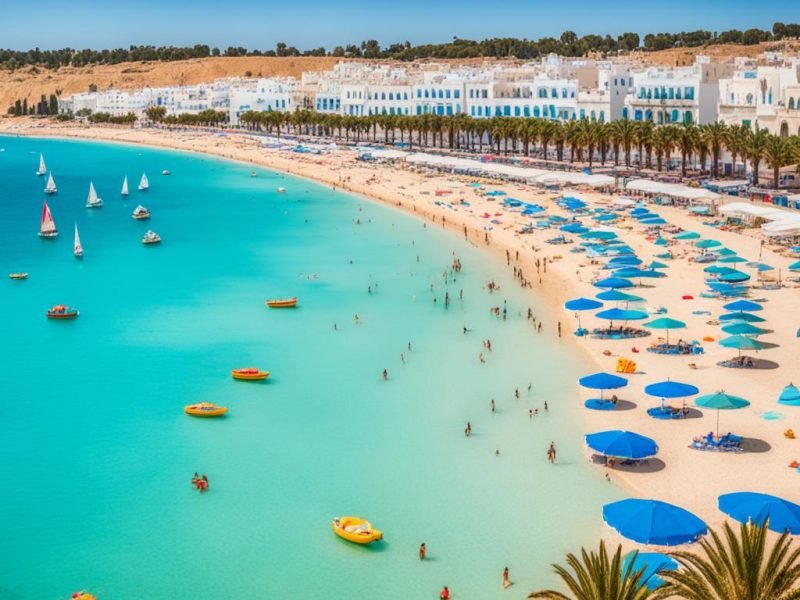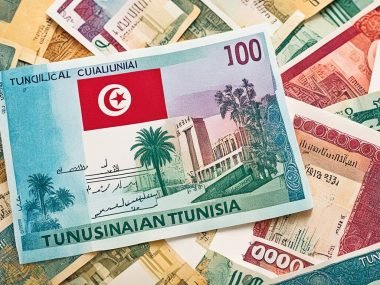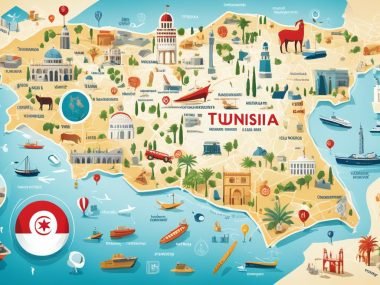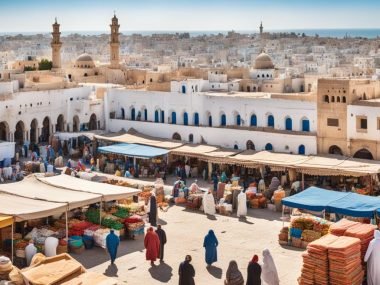Tunisia gets a lot of sun, about 3,000 hours every year. This makes it a great spot for people who love the sun. Summer starts in June and the weather gets warmer from March to June.
The best time for beach holidays starts then. There’s hardly any rain and the days are longer. The sea helps cool things down, making summer memorable. If you’re thinking of visiting Tunisia or just curious, its sunny weather is inviting.
Key Takeaways
- Tunisia boasts around 3,000 hours of sunshine each year.
- Summer typically starts in June with temperatures reaching up to 30°C.
- The transition from spring to summer is marked by increasing temperatures.
- Minimal rainfall and extended daylight hours characterise Tunisia’s summer months.
- The Mediterranean coastal waters provide a cooling retreat during the hot summer season.
Tunisia’s Climatic Diversity
Tunisia stretches from the north coast to the southern desert. This creates different weather patterns across the country. These differences affect the local weather, making some areas very different from others.
Northern Coastal Climate
In the north, the weather is like the Mediterranean. Winters are mild and wet, summers hot. It rains a lot, more than 700 mm a year. This helps grow olive, orange, and almond trees. This weather pattern is typical for the Mediterranean and helps farming a lot.
Southern Desert Inland Climate
But, in Southern Tunisia, it’s very dry. It hardly rains, sometimes less than 100 mm a year. The area is mostly big, sandy deserts. This makes life tougher and farming harder. Going from the green north to the dry south shows Tunisia’s weather variety.
Tunisia faces challenges because of changing weather patterns. The different weather areas make these challenges unique. They also offer special chances to adjust and be resilient.
When Does Summer Start In Tunisia?
The beginning of Tunisian summer starts in June. It gets really warm then. Days become long and perfect for the beach.
Summer in Tunisia matches the northern hemisphere’s season. It’s warm from March to May. Then, it stays warm until the end of September. July and August are the hottest.
So, what kicks off Tunisia’s summer? Sunny, long days and warmer weather. The sea makes it perfect for outdoor fun.
Typical Summer Weather in Tunisia
Summer in Tunisia means hot weather and long days. The weather changes in different months and places. Let’s look at what summer is like there.
June Weather Patterns
Summer starts in June with a temperature of about 29°C. It’s dry, making it great for beach trips. The sea gets warm, about 22°C, perfect for swimming.
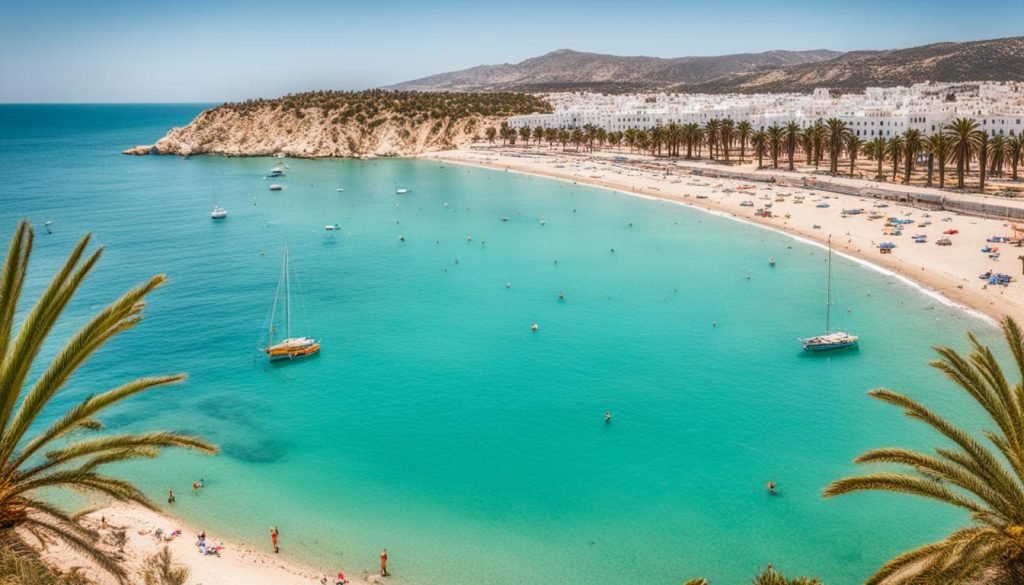
July and August Peak Temperatures
In July and August, it gets even hotter. Temperatures go up to 32°C to 35°C. This is the hottest time in Tunisia, very hot and dry. But, the sea breeze on the coast helps. It feels cooler there, making beach time fun. The sea also warms up to about 26.5°C, great for water sports.
Coastal Versus Inland Temperatures
The sea breeze cools the coast, unlike the hot inland. Inland, especially in deserts, it gets much hotter. This difference is key for planning trips. It matters if you want beach days or desert adventures.
Whether you like calm beaches or desert fun, knowing the weather helps plan your trip. This ensures you have a great time in Tunisia’s summer.
Pre-Summer Activities and Events
Tunisia gets warm and lively as summer approaches. During April and May, the weather is great for both tourists and locals. It’s a time to dive into the country’s rich culture and community vibes.
April and May Cultural Events
April and May are important for Tunisia’s culture. The weather gets warmer, making it a great time for events. In April, people remember Martyrs’ Day on April 9th. It’s a day to honour those who fought for independence. May brings Labour Day on May 1st. It’s a celebration for workers, with parades and gatherings.
Public Holiday Celebrations
Experiencing Tunisia’s public holidays helps you understand its culture. These days reflect the country’s history and values. March has Independence Day on March 20th and Youth Day on March 21st. People celebrate with pride, parades, and family get-togethers. The good weather in April makes it perfect for enjoying these festivities.
The mix of cultural events and holidays is special in pre-summer Tunisia. It’s a chance to see Tunisia’s heritage and enjoy the good weather. Here’s a list of some key events and holidays:
| Event | Date | Description |
|---|---|---|
| Independence Day | March 20th | National celebration of Tunisia’s independence from France. |
| Youth Day | March 21st | A holiday recognising the contributions and energy of the nation’s youth. |
| Martyrs’ Day | April 9th | A solemn day honoring those who died fighting for independence. |
| Labour Day | May 1st | An international holiday celebrating workers and labour movements. |
Best Time to Visit Tunisia for Sun
For those who love the sun, visiting Tunisia is best in April to May or September to November. During these months, you can enjoy warm weather without too many people around. It’s a great time for a peaceful yet fun holiday.
April to May
From April to May, Tunisia warms up. The air smells of jasmine and the weather is nice. It’s a good time to see Tunisia’s beautiful places without the crowds.
September to November
September to November is also a great time to go. The very hot weather cools down a bit. These months are perfect for a calm visit. You can enjoy the beach or explore other parts of Tunisia.
Impact of Summer Climate on Tourism
Summer weather hugely shapes tourism in Tunisia. The nation’s varied scenery and rich history are big draws. Specific weather patterns greatly sway what travellers like.
Peak Tourist Seasons
July and August bring lots of tourists to Tunisia. Its warm sea climate attracts many to beaches and lively resorts. During this time, there’s plenty to do and lots of sun to enjoy.
- High demand for accommodations
- Increased prices due to influx of tourists
- A lively ambiance at key tourist spots
Off-Peak Travel Benefits
On the other hand, visiting in the low seasons offers perks. It’s cooler, so seeing places is easier. Plus, there won’t be as many people at big attractions.
Tunisia’s low seasons advantages include save money on stays and services. It’s great for a quiet, cost-friendly holiday.
| Seasons | Peak (July – August) | Off-Peak (April – May, September – November) | ||||||||||||
|---|---|---|---|---|---|---|---|---|---|---|---|---|---|---|
| Climate | Hot and bustling | Milder and tranquil | ||||||||||||
| Crowds | High congestion | Low congestion | ||||||||||||
| Costs | Higher prices | More competitive pricing |
| Accommodation Type | Location | Notable Features |
|---|---|---|
| Luxury Resorts | Djerba | Lavish amenities, stunning beach views |
| Charming Hotels | Sousse | Blend of modern comfort and traditional decor |
| Traditional Riads | Tunis Medina | Authentic local experience, historical significance |
Conclusion
As summer ends in Tunisia, it leaves everyone with vivid memories. Tunisia’s climate mixes well. It lets you explore coasts and the vast Sahara. This mix makes for perfect weather for beach and desert fun.
Travel tips include enjoying cultural events in April and May. Make the most of the sunny weather from June to August. Also, enjoy the mild weather from September to November. Stay safe during high temperatures and heatwaves.
Summer attracts many visitors to Tunisia. Knowing the weather helps make your trip great. Tunisia is a top summer spot. It has rich culture and lovely sights waiting for you.
Source Links
- https://seasonsyear.com/Tunisia – Seasons in Tunisia: Weather and Climate
- https://horizontunisia.org/when-does-summer-start-in-tunisia/ – When Does Summer Start In Tunisia?
- https://horizontunisia.org/when-does-the-season-start-in-tunisia/ – When Does The Season Start In Tunisia?

